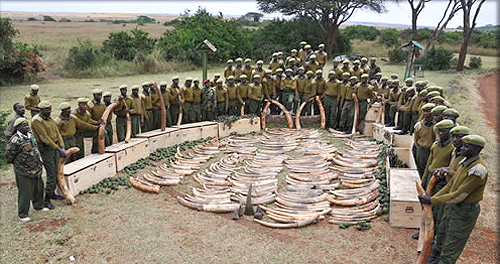
Yes, for sure, if you believe that every law promulgated by man should be obeyed. The 317 pieces of raw elephant ivory (weighing 2 tonnes) and the five rhino horn were illegal cargo by both international and Kenyan law.
They were disguised in a container marked as avocados destined for Kuala Lumpur via Dubai on Emirates Airlines.
What’s interesting about this seizure made in Nairobi last week is that all the tusks and horns appear to be from animals that died naturally.
That leads to all sorts of other questions, of course. Is this an inside job, for instance?
Until now anyway, virtually all tusks and horns confiscated from dead animals were made by wildlife authorities. For one thing the park rangers generally know of the elephant and wild rhino that are ready to die, so they’re followed closely usually up to the very death.
And elephant and rhino die regularly to be sure. But the tusks from likely more than 80 elephants, and the horns from five rhino, means the cache was not collected quickly. At the very least we’re talking about a project of several years, and maybe more.
If it isn’t an inside job, then from my point of view these guys aren’t quite as bad as their counterparts who actually kill animals. And so far that’s what KWS is saying. It wasn’t an inside job.
Whoa. I’m not suggesting breaking the laws banning the ivory trade are sometimes OK. The point of the law is that any trade that occurs, whatever, generates a market that motivates more illegal trade. What I mean is let’s go a little bit lighter on the punishment.
Combing the bush for dead animals is a lot different than killing live animals.
Let me know what you think.
Partially true. I hunted Chobe in Zimbabwe in 1977 and we did walk onto a dead elephant with tusks, the government game scout confiscated the tusks and told me that since the embargo on ivory trade, they collect and burn all found and seized ivory. Destroying ivory should be a sin. In Kenya they have banned hunting, so the only value to locals is animals for meat. You and I would do the same if we were hungry. We caught 5 poachers in Tanzania on my last trip in 2008, they put them in jail for 5 years each, during my hunt we fed a village with free meat for them, no yama (swahili for meat) goes to waste in Africa, we leave a blood spot on the ground, and not an ounce of meat is wasted. Except for in cities, African people are the happiest people I’ve ever met. They still suffer badly with malaria, and bad drinking water????how many billions of U.S. dollars have been sent to their leaders, only to be sent on to a swiss bank account, and not a penny used to help the poor suffering native people. A beautiful native wife in Tanzania sells for about $1000 U.S. dollars ( or 20 cows) about the same price to shoot a kudu. A beautiful black skinned princess, you own, no marriage ceremony required as seen in ‘Coming to America’ starring Eddie Murphy. No birth certificates either……hmmmm